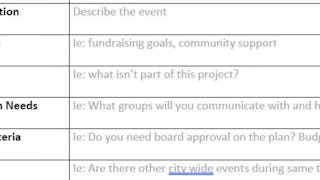Projects are all around us. Virtually every organization runs projects, either formally or informally. We are engaged in projects at home and at work. Across settings, planning principles and execution methodologies can offer ways in which projects can be run more effectively and efficiently. Project management provides organizations (and individuals) with the language and the frameworks for scoping projects, sequencing activities, utilizing resources, and minimizing risks.


Fundamentals of Project Planning and Management

Instructor: Yael Grushka-Cockayne
381,245 already enrolled
Included with
(10,347 reviews)
Recommended experience
What you'll learn
How to initiate, define and organize a project
How to develop a project plan, including scoping, sequencing tasks, and determining a critical path
How to assess, prioritize and manage project risk
How to execute projects and use the earned value approach for monitoring and controlling progress
Skills you'll gain
Details to know

Add to your LinkedIn profile
5 assignments
See how employees at top companies are mastering in-demand skills

There are 4 modules in this course
Welcome to the course -- we're excited you're here! In our first week, we'll gain an understanding of what a project is, what it isn't, and why that matters. We'll consider how projects are defined and a project’s three objectives. We'll look at a model for examining a project’s organization and its stakeholders, and then analyze those stakeholders using a power/interest grid. We'll look at the main reasons why many projects fail and then learn how to measure success. Finally, we'll review the key stages in the project life cycle and highlight the important features of each stage.
What's included
8 videos4 readings1 assignment3 discussion prompts
During our second week, we'll start digging into the details, focusing on how to develop a project plan. We'll understand why we plan and what a plan should or should not include. We'll discuss the process of scoping out a project and see tools that can help us identify what should be included in our project. We'll learn about sequencing project tasks and the nature of the dependencies among project activates. We'll learn how to determine a project’s duration and critical path, how it is determined, and why it is useful. We'll see how we should schedule a project and, finally, we’ll review how you can make changes to a plan to support your overall project objectives.
What's included
9 videos1 reading1 assignment1 discussion prompt
In our third week, we'll consider the risk and uncertainties projects face. We'll understand what is risky about projects. We'll identify and assess project risks and prioritize these risks in order to focus our attention on those most impactful to the project. We’ll consider schedule risks in detail and ask, "What is the likelihood of finishing on time? What are the drivers that may cause delays in my project?" We'll see how a project budget can be set to include a contingency. Finally, we'll consider situations with a high degree of ambiguity and identify methods than can useful in these situations.
What's included
9 videos1 reading1 assignment1 discussion prompt
In our final week, we'll move from plan to action and consider the execution phase of a project. We'll learn about the earned value approach for monitoring and controlling progress. We'll consider the individuals who are executing the project and how their habits impact project progress. We'll discuss some alternative methods for project execution such as Agile, Scrum, and Kanban. Finally, we'll review and summarize the course, and our journey from project definition through execution and completion.
What's included
9 videos2 readings2 assignments2 discussion prompts
Instructor

Offered by
Explore more from Business Essentials
 Status: Free Trial
Status: Free TrialJohns Hopkins University
 Status: Free Trial
Status: Free Trial Status: Free Trial
Status: Free TrialUniversity of California, Irvine
Why people choose Coursera for their career




Learner reviews
10,347 reviews
- 5 stars
78.50%
- 4 stars
18.96%
- 3 stars
1.86%
- 2 stars
0.29%
- 1 star
0.36%
Showing 3 of 10347
Reviewed on Jun 25, 2019
Interesting course which covers all necessary topics in Project planning and management. The case study used in this course was very nice which helps even a beginner to understand the basics.
Reviewed on Sep 6, 2020
Very informative, concise, and easy to digest. Provides a solid foundation / framework for approaching projects, with great tutorials on using software for analysis. Great experience overall, thanks!
Reviewed on Dec 15, 2021
This is very good course to understand the fundamentals of project planning and management. The instructor explain the concept in a simple way. There are good examples given to understand the course.

Open new doors with Coursera Plus
Unlimited access to 10,000+ world-class courses, hands-on projects, and job-ready certificate programs - all included in your subscription
Advance your career with an online degree
Earn a degree from world-class universities - 100% online
Join over 3,400 global companies that choose Coursera for Business
Upskill your employees to excel in the digital economy
Frequently asked questions
To access the course materials, assignments and to earn a Certificate, you will need to purchase the Certificate experience when you enroll in a course. You can try a Free Trial instead, or apply for Financial Aid. The course may offer 'Full Course, No Certificate' instead. This option lets you see all course materials, submit required assessments, and get a final grade. This also means that you will not be able to purchase a Certificate experience.
When you purchase a Certificate you get access to all course materials, including graded assignments. Upon completing the course, your electronic Certificate will be added to your Accomplishments page - from there, you can print your Certificate or add it to your LinkedIn profile.
Yes. In select learning programs, you can apply for financial aid or a scholarship if you can’t afford the enrollment fee. If fin aid or scholarship is available for your learning program selection, you’ll find a link to apply on the description page.
More questions
Financial aid available,


